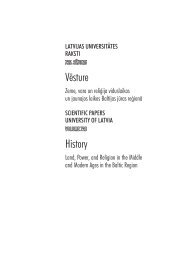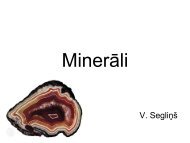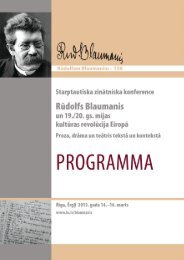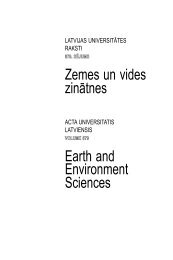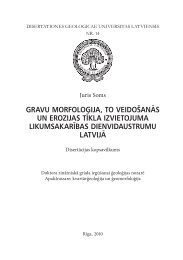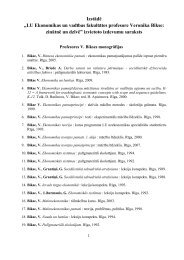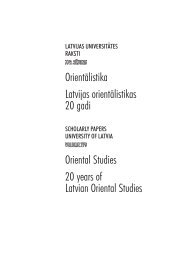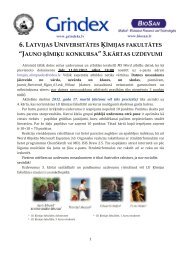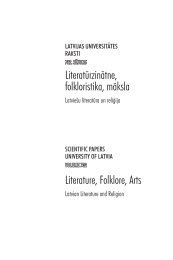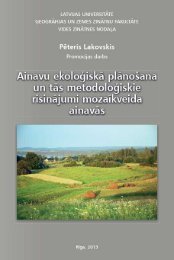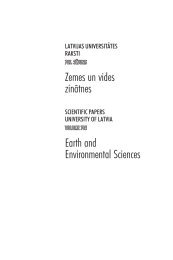Latgalistikys kongresu materiali, III. 2011. - Latvijas Universitāte
Latgalistikys kongresu materiali, III. 2011. - Latvijas Universitāte
Latgalistikys kongresu materiali, III. 2011. - Latvijas Universitāte
Create successful ePaper yourself
Turn your PDF publications into a flip-book with our unique Google optimized e-Paper software.
172<br />
ROMANS SUOCĀS AR EPIGRAFISKU EKSPOZICEJU — DOBYS<br />
AINOVU, TRADICIONALI, TAITOD. 57 (Seiksts, Lukaševičs 1996: 3)<br />
Such commentaries appear throughout the narration concerning the<br />
development of its plot, the formation of characters, setting, the philosophy<br />
and symbolism of the novel. The self-referential voice also tries to account<br />
for the complex narrative structure as if making clear the rules of the<br />
game in the narrattive:<br />
I KAIDA NŪZEIME, KURS PERSONAŽS KOD RUNOJ, KAIDA TAM<br />
NŪZEIME, NU PASTUOSTIT MAŅ, DURACENI? AK SIŽETS<br />
SASAŠOTOJ TAI, KA NI VALNA NAVAR SAPRAST? NU PAPROSIT<br />
ANDRAM PAR SIŽETU! VOI TAM MODŪNYS GLUPEIŠAM, KURŪ<br />
JĪ AR STEPONU APDZIRDEJA PAGUOJUŠU VOSORU PI PYRMUOS<br />
STACEJIS, VOI TAM SLEIKŪŅAM, KURŪ MES ĪRAUDZEJOM<br />
KOUŠĀ PI MASLENĪKU DZARDAMI IZ PUSSOLYS VEINU,<br />
NŪSABEIDOM, KA DAĪS SKAIDRUOTĪS AR KAIDIM NAVĪN<br />
GLUPIM POLICISTIM I NŪBĀGOM. PIEČUOK JUO JAU TĪŅUOK<br />
NABEJA. SKAIDRS NIULE? I TYS NIKUO, KA NAV SKAIDRS.<br />
VALERJANAM TAIPOŠ NI JAU VYSS IR SAPRŪTAMS. JYS SĒD IZ<br />
AUTOŪSTYS JUMTA I TĀLOJ DAO. VYSPUOR LĪK KILUNU IZ<br />
VYSA. 58 (Seiksts, Lukaševičs 1996: 177)<br />
Besides, the self-referential line is sustained in the narrative by the<br />
repeated address to some goddess who may be perceived as an allusion to<br />
Homer’s Muse, only instead of invoking her to sing in this case she is constantly<br />
questioned as to the truthfulness of what is being presented by<br />
asking, “VOI TO NĀ, DĪVESTE?“ 59<br />
These comments and constant verifications of the truthfulness of narration<br />
create an ironic effect and thus set a distance that has very important<br />
aesthetic functions in the text. This ironic distance first of all puts to doubt<br />
the very possibility of any plausible depiction of the complex world projected<br />
out of characters and narrators’ acts, talks, thoughts, fantasies,<br />
57 ‘The novel starts with an epigraphic exposition — a landscape, hence, in a traditional<br />
way.’<br />
58 ‘And what does it matter which character is speaking now or then, what does it<br />
matter, tell me, you fools? You say, you can’t make a heck of the plot? Well, ask<br />
andrs about the plot! Or that lunatic from madona whom he and stepons made drunk<br />
last summer by the first station, or that drowned man whom we noticed while<br />
drinking wine on the peninsula, we got scared that we’ll have to deal with some stupid<br />
cops and ran away. Later he was no longer there. Is it clear now? And it doesn’t<br />
matter if it’s not clear. Valerian does not understand everything either. He is sitting<br />
on the bus station roof and acting dao. And generally not giving a damn.’<br />
59 ‘Isn’t it so, goddess?’ Or: ‘Right, goddess?’



